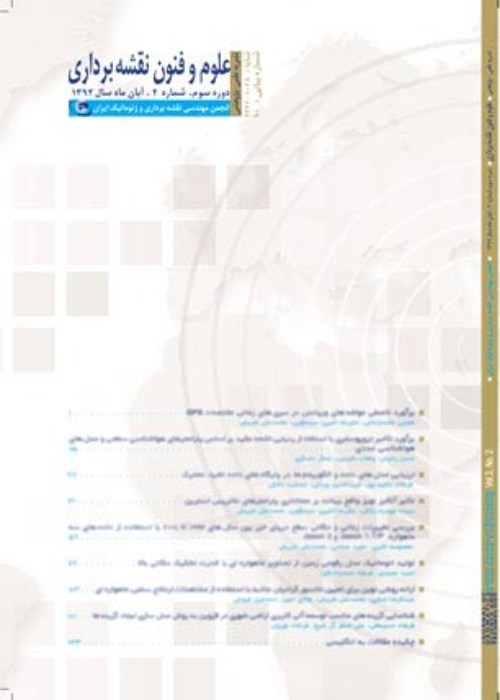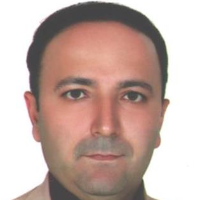Evaluation of the Efficiency of the Adaptive Neuro Fuzzy Inference System (ANFIS) in the Modeling of the Ionosphere Total Electron Content Time Series Case Study: Tehran Permanent GPS Station
Author(s):
Article Type:
Research/Original Article (دارای رتبه معتبر)
Abstract:
Global positioning system (GPS) measurements provide accurate and continuous 3-dimensional position, velocity and time data anywhere on or above the surface of the earth, anytime, and in all weather conditions. However, the predominant ranging error source for GPS signals is an ionospheric error. The ionosphere is the region of the atmosphere from about 60 km to more than 1500 km above the earth surface. The ionospheric delay is the main error source for GPS. The delay can vary from a few meters to tens of meters depending on the solar cycle, hour of day, season, geographic location and satellite elevation angle. Knowledge of the ionospheric electron density is essential for a wide range of applications, e.g., radio and telecommunications, satellite tracking, and earth observation from space. In order to understand the nature of those causes and to analyze ionospheric structure, it is necessary to monitor the variations on the electron density of the ionosphere both spatially and dynamically. Because of the dispersion of the ionospheric layer and its destructive effect on passing waves, modeling and predicting the behavior of this layer of the atmosphere is one of the most useful topics in geodesy and space studies. The parameter used to study the physical properties of the ionosphere is called the Total Electron Content (TEC).
For modeling the TEC, many methods have been proposed that require large computational operations and sometimes lack sufficient precision for ionospheric modeling. In this paper, the adaptive neuro-fuzzy inference system (ANFIS) is used to predict TEC variations for the next day. An adaptive neuro-fuzzy inference system or adaptive network-based fuzzy inference system is a kind of artificial neural network that is based on Takagi–Sugeno fuzzy inference system. The technique was developed in the early 1990s. Since it integrates both neural networks and fuzzy logic principles, it has potential to capture the benefits of both in a single framework. Its inference system corresponds to a set of fuzzy IF–THEN rules that have learning capability to approximate nonlinear functions. Hence, ANFIS is considered a universal estimator.
In order to do this, observations of Tehran's permanent GPS station were used for three different months (May, April and December) for years (2015 and 2011) to train the Anfis network, and predictions is made for days (30, 3, and 6) in the months of May , December and April. These observations have been selected to include high, medium, and low solar activity. The genetic algorithm has been designed to determine the optimal time lag for training the Anfis network. Also, to evaluate the results of the adaptive neuro-fuzzy inference system, the TEC values obtained from this system has been compared with artificial neural network (ANN) values with the Levenberg-Marquardt training algorithm, TEC derived from the GPS, and finally with the international reference ionosphere (IRI2016) TEC. The maximum RMSE for the difference between the predicted TEC and the observed TEC is 4.6 TECU for the Anfis, 5.06 TECU for the ANN and 5.8 TECU for the IRI 2016. Also, the minimum RMSE is computed 2.1 TECU for the Anfis, 2.6 TECU for the ANN and 4.3 TECU for the IRI 2016. The results demonstrate the high capability of the ANFIS network in the ionospheric time series modeling.
For modeling the TEC, many methods have been proposed that require large computational operations and sometimes lack sufficient precision for ionospheric modeling. In this paper, the adaptive neuro-fuzzy inference system (ANFIS) is used to predict TEC variations for the next day. An adaptive neuro-fuzzy inference system or adaptive network-based fuzzy inference system is a kind of artificial neural network that is based on Takagi–Sugeno fuzzy inference system. The technique was developed in the early 1990s. Since it integrates both neural networks and fuzzy logic principles, it has potential to capture the benefits of both in a single framework. Its inference system corresponds to a set of fuzzy IF–THEN rules that have learning capability to approximate nonlinear functions. Hence, ANFIS is considered a universal estimator.
In order to do this, observations of Tehran's permanent GPS station ( ) were used for three different months (May, April and December) for years (2015 and 2011) to train the Anfis network, and predictions is made for days (30, 3, and 6) in the months of May , December and April. These observations have been selected to include high, medium, and low solar activity. The genetic algorithm has been designed to determine the optimal time lag for training the Anfis network. Also, to evaluate the results of the adaptive neuro-fuzzy inference system, the TEC values obtained from this system has been compared with artificial neural network (ANN) values with the Levenberg-Marquardt training algorithm, TEC derived from the GPS, and finally with the international reference ionosphere (IRI2016) TEC. The maximum RMSE for the difference between the predicted TEC and the observed TEC is 4.6 TECU for the Anfis, 5.06 TECU for the ANN and 5.8 TECU for the IRI 2016. Also, the minimum RMSE is computed 2.1 TECU for the Anfis, 2.6 TECU for the ANN and 4.3 TECU for the IRI 2016. The results demonstrate the high capability of the ANFIS network in the ionospheric time series modeling.
For modeling the TEC, many methods have been proposed that require large computational operations and sometimes lack sufficient precision for ionospheric modeling. In this paper, the adaptive neuro-fuzzy inference system (ANFIS) is used to predict TEC variations for the next day. An adaptive neuro-fuzzy inference system or adaptive network-based fuzzy inference system is a kind of artificial neural network that is based on Takagi–Sugeno fuzzy inference system. The technique was developed in the early 1990s. Since it integrates both neural networks and fuzzy logic principles, it has potential to capture the benefits of both in a single framework. Its inference system corresponds to a set of fuzzy IF–THEN rules that have learning capability to approximate nonlinear functions. Hence, ANFIS is considered a universal estimator.
In order to do this, observations of Tehran's permanent GPS station were used for three different months (May, April and December) for years (2015 and 2011) to train the Anfis network, and predictions is made for days (30, 3, and 6) in the months of May , December and April. These observations have been selected to include high, medium, and low solar activity. The genetic algorithm has been designed to determine the optimal time lag for training the Anfis network. Also, to evaluate the results of the adaptive neuro-fuzzy inference system, the TEC values obtained from this system has been compared with artificial neural network (ANN) values with the Levenberg-Marquardt training algorithm, TEC derived from the GPS, and finally with the international reference ionosphere (IRI2016) TEC. The maximum RMSE for the difference between the predicted TEC and the observed TEC is 4.6 TECU for the Anfis, 5.06 TECU for the ANN and 5.8 TECU for the IRI 2016. Also, the minimum RMSE is computed 2.1 TECU for the Anfis, 2.6 TECU for the ANN and 4.3 TECU for the IRI 2016. The results demonstrate the high capability of the ANFIS network in the ionospheric time series modeling.
For modeling the TEC, many methods have been proposed that require large computational operations and sometimes lack sufficient precision for ionospheric modeling. In this paper, the adaptive neuro-fuzzy inference system (ANFIS) is used to predict TEC variations for the next day. An adaptive neuro-fuzzy inference system or adaptive network-based fuzzy inference system is a kind of artificial neural network that is based on Takagi–Sugeno fuzzy inference system. The technique was developed in the early 1990s. Since it integrates both neural networks and fuzzy logic principles, it has potential to capture the benefits of both in a single framework. Its inference system corresponds to a set of fuzzy IF–THEN rules that have learning capability to approximate nonlinear functions. Hence, ANFIS is considered a universal estimator.
In order to do this, observations of Tehran's permanent GPS station ( ) were used for three different months (May, April and December) for years (2015 and 2011) to train the Anfis network, and predictions is made for days (30, 3, and 6) in the months of May , December and April. These observations have been selected to include high, medium, and low solar activity. The genetic algorithm has been designed to determine the optimal time lag for training the Anfis network. Also, to evaluate the results of the adaptive neuro-fuzzy inference system, the TEC values obtained from this system has been compared with artificial neural network (ANN) values with the Levenberg-Marquardt training algorithm, TEC derived from the GPS, and finally with the international reference ionosphere (IRI2016) TEC. The maximum RMSE for the difference between the predicted TEC and the observed TEC is 4.6 TECU for the Anfis, 5.06 TECU for the ANN and 5.8 TECU for the IRI 2016. Also, the minimum RMSE is computed 2.1 TECU for the Anfis, 2.6 TECU for the ANN and 4.3 TECU for the IRI 2016. The results demonstrate the high capability of the ANFIS network in the ionospheric time series modeling.
Keywords:
Ionosphere , TEC , Fuzzy Logic , GPS , Neural Network , ANFIS
Language:
Persian
Published:
Journal of Geomatics Science and Technology, Volume:8 Issue: 4, 2019
Pages:
109 to 119
magiran.com/p2002802
دانلود و مطالعه متن این مقاله با یکی از روشهای زیر امکان پذیر است:
اشتراک شخصی
با عضویت و پرداخت آنلاین حق اشتراک یکساله به مبلغ 1,390,000ريال میتوانید 70 عنوان مطلب دانلود کنید!
اشتراک سازمانی
به کتابخانه دانشگاه یا محل کار خود پیشنهاد کنید تا اشتراک سازمانی این پایگاه را برای دسترسی نامحدود همه کاربران به متن مطالب تهیه نمایند!
توجه!
- حق عضویت دریافتی صرف حمایت از نشریات عضو و نگهداری، تکمیل و توسعه مگیران میشود.
- پرداخت حق اشتراک و دانلود مقالات اجازه بازنشر آن در سایر رسانههای چاپی و دیجیتال را به کاربر نمیدهد.
In order to view content subscription is required
Personal subscription
Subscribe magiran.com for 70 € euros via PayPal and download 70 articles during a year.
Organization subscription
Please contact us to subscribe your university or library for unlimited access!




